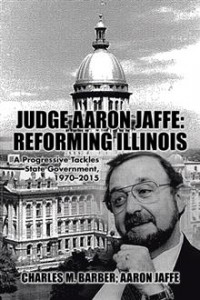Title: Judge Aaron Jaffe: Reforming Illinois – A Progressive Tackles State Government,1970–2015
Author: Charles M. Barber; Aaron Jaffe
Publisher: AuthorHouse
ISBN: 978-1-5049-8386-0
Pages: 702
Genre: Political Biography
Pacific Book Review
Whenever a book challenges popular opinion, it is worth a look. “Judge Aaron Jaffe: Reforming Illinois” doesn’t just confront deeply held beliefs, it also offers solutions to seemly intractable problems. Popular opinion views most politicians as corrupt. Politicians who cut their teeth in Illinois are perceived as particularly venal. Recently a humor columnist blamed the state’s budget crisis on the need to construct additional prisons for the numerous convicted governors and legislators.
Author Charles M. Barber singles out filmmaker Frank Capra Jr.’s Mr. Smith Goes to Washington for contributing to a viewpoint nearly eight decades later where “professional politicians are irredeemably corrupt, compared to the hard-boiled but virtuous representatives of the media or to the fanciful, Boy Scout types [like Jimmy Stewart’s Smith.] Barber believes most politicians genuinely want to help their constituents. He sees the system where political leaders like Cook County alderman and ward bosses assist with everything from employment connections to road repair in exchange for voter’s support as both positive and democratic. To him it is miles away from borderline criminal “pay-for-play” often depicted in media accounts.
In “Judge Aaron Jaffe: Reforming Illinois,” Barber provides numerous examples of how politicians succeed. The work’s origins trace back over forty years, when Barber was a teacher and a self-described “anti machine” Democrat. That was when “I met this honest, liberal, courageous and effective Illinois legislator by the name of Aaron Jaffe.”
“This book is about process,” Barber explains, “how to get things done in a legislature, from the bench and in a state executive office,.” He approaches this task by transcribing a rollicking conversation between himself and the old pol [politician.] Although Jaffe pent 20 years as a judge in the Cook County Circuit Court, the book is primarily focused on his seven terms in the Illinois House of Representatives. Numerous pages are devoted to the intricacies of Illinois politics from the “country towns” outside of Chicago to the statehouse. Despite this, there is much to offer for those unfamiliar with the state’s machinations and characters.
Although Jaffe was elected as a Democrat, he was known for reaching across the aisle. His efforts to reconcile disparate elements in the House allowed him to champion groundbreaking Anti-Rape Legislation, reform divorce law and be the sole white man appointed to the Black Caucus. Jaffe was commonly described as the “darling of the Independent Voters of Illinois.” Although Barber’s unabashed use of the self-description “liberal,” is commendable, the work suffers from more than a few ad hominem attacks like his description of 2010 elections’ backlash against President Barack Obama’s agenda as driven in part by “racism disguised by other issues like health care insurance reform.” Since the author presumably wishes to do more than preach to the converted, such comments will dissuade readers who manage to be both non-racist and opposed to the Affordable Care Act. Finally, a perhaps minor quibble about “Judge Aaron Jaffe: Reforming Illinois’” unnecessarily lengthy prefatory material. Super Bowl fans and those who remember their high school Latin will be able to translate the unwieldy page number “xlix” –– “49.” Despite those flaws, political junkies and those interested in promoting bi-partisan reforms in a time of increasing partisanship will find much to savor. This book will find a welcome place on their shelves.


